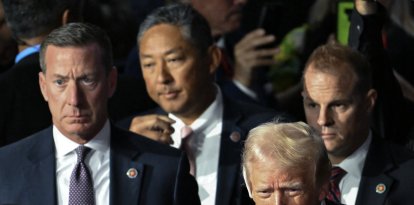Four falsehoods about Milei
The fear campaign has not stopped in Argentina, so, before it is too late, it is necessary to make some perhaps obvious clarifications to understand what the government's true objectives are.

Cordon Press
Numerous media outlets, leaders of social organizations, millionaire trade unionists and opposition politicians continue to use scare tactics across the country, which began even before Javier Milei assumed the presidency.
Statements against the libertarian president have become increasingly stronger, since the usual critics take advantage of the country's bad moment to launch the fiercest criticism, although, of course, they do not make a single mention of the fact that today Argentina is submerged in a historic crisis largely due to the disastrous four years under the government of Alberto Fernández and Cristina Fernández de Kirchner. And it is necessary to clarify that the current administration has only been in power for a little over 40 days. Strange, right?
However, this is not constructive criticism, rather an attempt to demonize an atypical government with various falsehoods. Therefore, before it is too late, it is necessary to make some perhaps obvious clarifications to understand what the government's true objective is.
Milei is against workers' rights
First of all, we must understand that informal work in Argentina is over 40%. This happens, of course, due to the enormous number of regulations that make it difficult for employers to hire workers legally. Another important aspect to take into account is rampant labor litigation, unfortunately very widespread in the country, which implies another obstacle to businesses when looking for personnel. Furthermore, it is impossible to forget the issue of inflation, which destroys people's salaries. This led to something unusual happening under Alberto Fernández and Cristina Kirchner: even those who had a job could not make ends meet. This majestic disaster must be resolved with a profound labor reform, which Milei and his entourage have been working toward. But, as expected, it is being hindered by those who benefit from the current status quo: mafia unionists, poverty managers misnamed “social leaders” and bureaucrats who base their power on poverty.
Therefore, one wonders, what rights is Milei attacking? The right not to work? The right not to make ends meet by working several hours a day? In any case, technical aspects can be discussed on some points, but a profound reform is absolutely necessary.
Nor can we forget that, unlike a liberal like Milei, the objective of successive Kirchnerist governments has been to take over the state by placing a large number of militants, incorrectly called “state workers,” in various entities created for that purpose, or by granting money through various social plans and intermediaries friendly to power who have filled their pockets by managing poverty. The cost of all that also has to be paid by the real workers, which is why Milei is trying to radically change the situation.
Milei wants to destroy art and culture
This point is especially notable, since the president's girlfriend is an artist, so if there is someone he does not want to destroy, it is the woman he loves. However, Milei believes and trusts in her qualities to be able to obtain profits thanks to her work on stages and in television studios, without having to take money from people by resorting to the monopoly of force by the state. That is precisely what the government aspires to in everything related to art and culture; May everyone earn profits with dignity. However, several artists are criticizing the president for this, stating that he is seeking to repress culture and art, as if taking the out of the way meant destroying theaters, cinemas, rehearsal rooms, television studios, etc., with a bulldozer. Not at all, what is sought is simply to leave the matter to the market; ergo, let the consumer choose what to see, listen to and what not. As simple as that.
Anyone who opposes this recognizes that, for some reason, some artists (though not all) and people dedicated to culture have privileges over others, since there is no such protection for mechanics, carpenters, bakers, etc.
Some of them claim that some of the entities related to art and culture do not actually receive state funding, which is categorically false. They obtain the money through taxes on the purchase of movie tickets or from various businesses and companies that must pay for simply transmitting programs, series, movies, or simply for playing music at a party.
Although these fees must be paid even if the work done by the actors and musicians in question is not used, it should not be paid if it is. The best response to this argument was the one made by a carpenter in a comment I came across on social media. The worker said: “Then the actors must pay me every day they use the house that I built for them.” In this way, the internet user made it clear that these artists are only seeking extra privileges.
Milei causes prices to increase, and the money is not enough
It is strange that only now are many realizing the problem of inflation, despite the fact that the last administration was one of the worst in history in economic management. In those four years, there was not a general strike, but there will be one this Wednesday along with a large demonstration, all after only 45 days under the Milei government. Of course, it was predictable, since the usual unionists and poverty managers are not going to give in.
Milei clarified that the path would not be easy, that it would hurt and that it would be necessary to open up prices, while at the same time trying to shrink the state so that Argentina could someday return to the path of progress. Again, the ways to go about this can be discussed, of course, but the change must be profound, and no radical change is free.
Milei only benefits businesses
This idea is poorly stated. What we must say is that Milei’s objective is to benefit the consumer, who is the one who, by freely choosing, will benefit with their own money to the one who provides them with the best good or service at the best price. In fact, many of the country's noted businessmen do not agree with the president's plan, since their juicy income does not depend on surpassing the competition, but on a strong state that protects them from it. Therefore, if the government manages to advance with its program, the most successful companies will be those that deserve that success and not those that benefit at the expense of citizens because their owners have the right friends in power.
It is very important that Argentines are attentive to the fear campaign that is being carried out in various media; that they understand that the vast majority of opponents in all areas will not only try torpedo any measure that takes us on the path to normality, they will also try to delay the situation by distracting us with all kinds of maneuvers so that time continues to pass and the citizens' patience begins to run out.
Neither Milei nor those who surround him are perfect. I have not spared criticism when I thought it was appropriate. We must not blindly defend the government, and we must point out its mistakes, of course. However, one must know how to identify the falsehoods that are spread about the president and the government's plan. Milei is the last opportunity for Argentina to become a relatively normal country again, and that is goal is too vital to fall again into the trap of those who continue to see us as lab rats. For once, whatever the cost, let's try freedom.
























